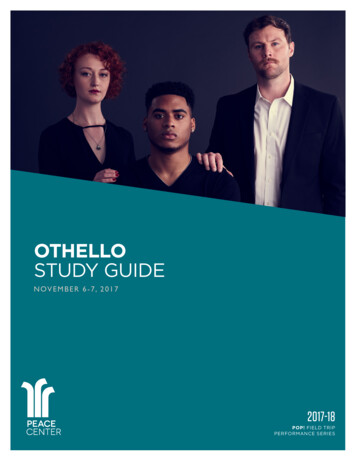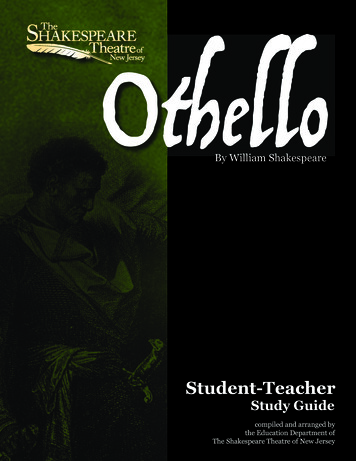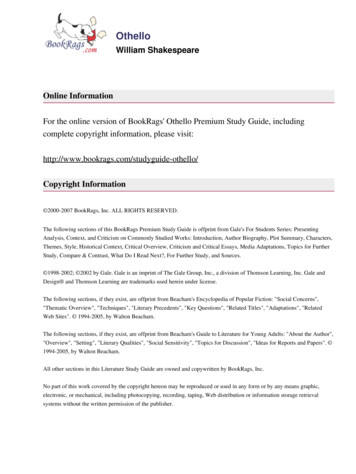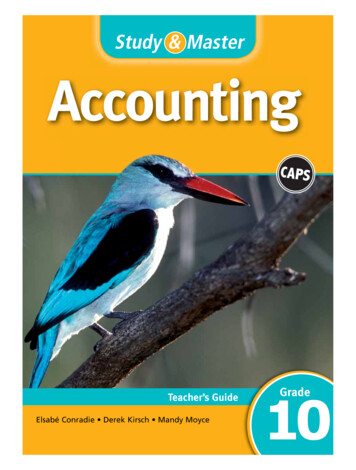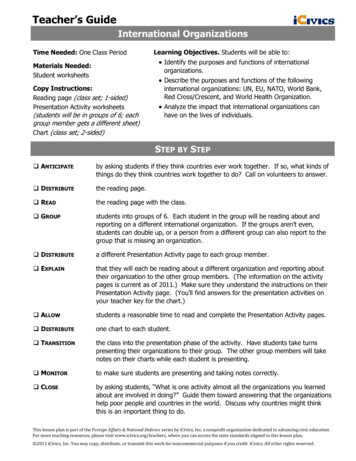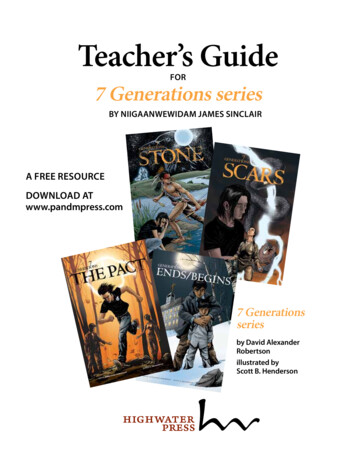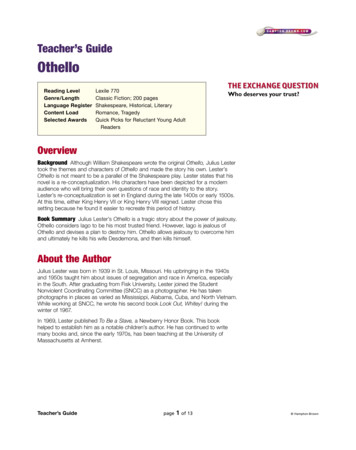
Transcription
Teacher’s GuideOthelloReading LevelGenre/LengthLanguage RegisterContent LoadSelected AwardsLexile 770Classic Fiction; 200 pagesShakespeare, Historical, LiteraryRomance, TragedyQuick Picks for Reluctant Young AdultReadersTHE EXCHANGE QUESTIONWho deserves your trust?OverviewBackground Although William Shakespeare wrote the original Othello, Julius Lestertook the themes and characters of Othello and made the story his own. Lester’sOthello is not meant to be a parallel of the Shakespeare play. Lester states that hisnovel is a re-conceptualization. His characters have been depicted for a modernaudience who will bring their own questions of race and identity to the story.Lester’s re-conceptualization is set in England during the late 1400s or early 1500s.At this time, either King Henry VII or King Henry VIII reigned. Lester chose thissetting because he found it easier to recreate this period of history.Book Summary Julius Lester’s Othello is a tragic story about the power of jealousy.Othello considers Iago to be his most trusted friend. However, Iago is jealous ofOthello and devises a plan to destroy him. Othello allows jealousy to overcome himand ultimately he kills his wife Desdemona, and then kills himself.About the AuthorJulius Lester was born in 1939 in St. Louis, Missouri. His upbringing in the 1940sand 1950s taught him about issues of segregation and race in America, especiallyin the South. After graduating from Fisk University, Lester joined the StudentNonviolent Coordinating Committee (SNCC) as a photographer. He has takenphotographs in places as varied as Mississippi, Alabama, Cuba, and North Vietnam.While working at SNCC, he wrote his second book Look Out, Whitey! during thewinter of 1967.In 1969, Lester published To Be a Slave, a Newberry Honor Book. This bookhelped to establish him as a notable children’s author. He has continued to writemany books and, since the early 1970s, has been teaching at the University ofMassachusetts at Amherst.Teacher’s GuideHSLL.T3.TG.Othello.indd 1page1 of 13 Hampton-Brown9/21/06 6:00:40 PM
OthelloStudent Journal, page 1Reading the BookName:There are several options for reading Othello. They include:Student Journal Whole Class Assign sections of the book and discussion datesusing the planner on Student Journal, page 1. After studentsread a section and respond to the corresponding StudentJournal pages, have a class discussion. At the end of the book,the class meets for The Exchange.Othelloby Julius LesterReading ScheduleGroup members: Small Groups Read the book Introduction with the group.Group members then read an agreed-upon number of pages,complete the corresponding Student Journal pages, and meetto discuss. When they finish the book, they meet again for TheExchange. Use the planner on Student Journal, page 1 toestablish meeting times.OthelloStudent JournalIntroductionPages 2–4Chapters 1–7Pages 5–6Chapters 8–13Pages 7–8Chapters 14–23Pages 9–10Due DateDiscussion DateThe ExchangeAssessment Independently Students read the book on their own andthen meet as a group for The Exchange. Use the planner onStudent Journal, page 1 to establish the meeting time. Guided Reading Have students read Student Journal,page 2 and monitor their discussion of the What If? scenario.Read aloud the book Introduction to give students backgroundon the book. As students read, use the Before You Move Onquestions to guide comprehension. Use the Look Ahead to seta focus for reading the next set of pages. At the end of eachsection, assign the appropriate Student Journal pages. Discussthe pages before starting the next section. Establish a date forThe Exchange and record it on the planner.Who deservesyour trust?Student Journal, page 2OthelloGetting StartedGetting StartedWhat If?Have students read What If? on Student Journal, page 2and discuss the scenario. Encourage students to describe thesimilarities and differences between the scenario and their lives andimagine how the situation would affect them.You move to a new school and even though you miss your old friends,you have made new friends. You still talk to your old friends and hangout with them on the weekends.You go to a party and some of your old friends are there along with your newfriends. Later on, your old friend calls and tells you that your new friendwas saying that you are boring and they only hang out with you becausethey feel bad for you. You can’t believe what you are hearing becauseyou thought you could trust your new friends. They seemed so nice.Make notes about how this would affect you. Have students write their responses to the three questions belowthe scenario and compare answers with a partner or the group. Would you believe your old friend? Would you confront your new friends? Would you continue to be friends with your new friends? Have students discuss how the situation might relate to TheExchange question and then write a brief summary of theirdiscussion in the Student Journal.Connect to The Exchange Question Discuss how this situationcould relate to The Exchange Question: Who deserves your trust?Summarize your discussion.Teacher’s GuideHSLL.T3.TG.Othello.indd 2page2 of 13 Hampton-Brown9/21/06 6:00:41 PM
OthelloStudent Journal, page 3IntroductionOthelloHave students read the book Introduction. Check theircomprehension with the three follow-up questions on StudentJournal, page 3.IntroductionRead the Introduction on pages 9–11 in Othello. The Introduction will helpyou understand key concepts in the book. Knowing them will help youdiscuss and write about the book.The Introduction includes information about why the author chose to adapt the play the author’s writing style the similarities and differences between Shakespeare’s play and this novelversionAfter you read the Introduction, answer these questions to check yourunderstanding.1. Why did Julius Lester decide to write a new version of Othello?Lester thinks more people would enjoy Shakespeareanplays if the language were easier and the stories were toldin a more modern way.2. How did Julius Lester write the book so that readers can betterunderstand the story?Lester wrote the play as a novel using modern English.Sometimes he includes words from the original play too.These words appear in italics but do not interrupt the story.3. How is Lester’s novel similar to Shakespeare’s play? How is itdifferent?They both have the same main characters and storyline.The main difference is Lester’s decision to make IagoAfrican rather than Caucasian. Another difference is thesetting. Lester’s story is set in England in the early 1500swhile Shakespeare’s play is set in Italy and Cyprus.Student Journal, page 4Introduction: Key ConceptsOthelloHave students study the first Key Concept with the help of thegraphic organizer on Student Journal, page 4. After studying theexample, they should create similar graphic organizers to focustheir understanding of the remaining Key Concepts.Introduction: Key ConceptsConcept MapStudy the Concept Map for manipulative. Write a sentence using theword manipulative.Key oncept MapKey ConceptmanipulativeCharacteristics of concept:controllingmeanslyNot characteristic of concept:honestkindtruthfulDefinition of conceptsneaky anddishonestExamples of conceptlyingusing someone to get what you wantOn a separate sheet of paper, create a similar Concept Map for each ofthe Key Concept words. Write what the word is like (Characteristics) andwhat the word is not like. Use a dictionary to include a definition of theword and examples. Then write a sentence for each Key Concept word.Teacher’s GuideHSLL.T3.TG.Othello.indd 3page3 of 13 Hampton-Brown9/21/06 6:00:43 PM
OthelloPages 13–68Answers for Before You Move OnChapters 1 – 7Student Journal, page 5OthelloPAGE 191. Character’s Point of View Why does Desdemona doubtOthello’s feelings for her?She is worried that Othello will not be interested in herbecause she is young and not well-traveled.2. Conflict Reread pages 17 and 18. What problem starts the story?Lord Bertrand wants Desdemona to marry, but she keepsrefusing suitable men because she wants to marry someonethat she loves, like Othello.Respond to Chapters 1–71. Personal Response Desdemona feels like she has known Othellomuch longer than a year. Is there anyone in your life that you feel likeyou have known forever when it has not really been that long? Why?2. Evidence and Conclusions Reread page 57. What shows that Othellois not the type of person to betray his friends? Use the word betray inyour response.Othello knew that Emily wanted to marry him, but he didnot because he knew Iago loved her. He did not want tobetray Iago.3. Comparisons How do Desdemona and her father view lovedifferently? Why?PAGE 421. Conclusions Othello has promoted Michael. Why doesEmily react so negatively?She is worried about how Iago will react. She feels Iago istreated unfairly by Othello.Lord Bertrand doesn’t feel that love is necessary formarriage. He wants Desdemona to marry a wealthy manfrom a good family. Power and reputation are important tohim. Desdemona believes that she must marry someonewho means something to her. She believes in love.4. Generate Questions Write a question about this section for someoneelse reading this book. Exchange questions with them. Do you agreewith their answer?2. Character’s Motive Why does Othello talk to Michael abouthis feelings instead of going directly to Desdemona?Othello isn’t confident. He worries that Desdemona cannotlove him because of his age and skin color. He knows thatshe trusts Michael and will listen to him.OthelloPAGE 551. Comparisons Both Lord Bertrand and Iago hate Othello.Compare their reasons.Lord Bertrand thinks Othello acts morally superior. Iago isjealous of the love that his wife Emily has for Othello.2. Character’s Point of View Why does Michael not tellDesdemona how he feels about her?He is afraid that Desdemona will not share his feelings andhe wants to be loyal to Othello.PAGE 681. Summarize Othello and Desdemona finally marry but onlyafter some confusion. What happens?Father Thomas wrongly assumes that Michael is the groom.When he learns the truth, he tries to stop the wedding, butOthello proves that he has been baptized.2. Conclusions Reread pages 67 and 68. Why does Othelloworry after he marries Desdemona?He worries that something will happen to Desdemona andthen he will feel like an outsider again.Teacher’s GuideHSLL.T3.TG.Othello.indd 4Student Journal, page 6page4 of 13Respond to Chapters 1–7, continued5. Character In Chapters 1–7, we learn a lot about Iago. List detailsabout Iago that you have learned through his thoughts and interactionsin this section.Details Webis jealousof Othello andpeople’sMichaelfeelingshatesOthellobecauseof EmilyIago’sFeelings andCharacteristicshasa gift What do Iago’s characteristics tell you about him and what he iscapable of doing?Iago cannot be trusted. He is sneaky, manipulative, andjealous. He is capable of trying to ruin the life of someonehe hates. Hampton-Brown9/21/06 6:00:44 PM
OthelloPages 69–127Answers for Before You Move OnChapters 8 – 13Student Journal, page 7OthelloPAGE 831. Plot Iago’s discovery of the secret marriage triggers his planto destroy Othello. What is Iago’s plan?Iago plans to tell Lord Bertrand about the marriage becausehe knows Lord Bertrand will take action against Othello.2. Conclusions Describe how Iago treats Lord Bertrand andOthello. How is it different from how he really feels?He acts friendly and loyal to both, but inside, he dislikes themand is mean-spirited and vindictive.Respond to Chapters 8–131. Personal Response Iago poses as a friend to Othello, but he reallywants to destroy him. What are the traits of a true friend? Are truefriends ever jealous of one another? Why or why not?2. Inference Iago deceives Michael by telling him he should go toDesdemona and ask her to speak with Othello. What is the real reasonhe does this? Use the word deception in your response.Iago uses deception to get what he wants. He knows thatif he can plan to have Michael and Desdemona speakingprivately, he can get Othello to show up and see themtalking. He knows that Othello will become jealous andthink that Michael and Desdemona are secretly in love.3. Comparisons Compare how Othello and Lord Bertrand attempt to getthe King to rule in their favor.PAGE 1041. Flashback The King had a secret love for Lord Bertrand’swife. How does this influence his decision about Othello andDesdemona’s marriage?The King is jealous of Othello’s and Desdemona’s courage torisk being together and empathizes with their situation so herules in their favor.Lord Bertrand argues that it is a threat to the throne forOthello and Desdemona to be married. He says that Othelloused witchcraft to get Desdemona to fall in love with him.Othello tells the King that love is the only witchcraft heused. He tells the King that he and Desdemona are in love.4. Generate Questions Write a question about this section for someoneelse reading this book. Exchange questions with them. Do you agreewith their answer?2. Foreshadowing Why does Lord Bertrand tell Othello thatDesdemona will deceive him?It is a clue that Desdemona will deceive Othello or thatOthello will think she is deceiving him.Student Journal, page 8OthelloRespond to Chapters 8–13, continuedPAGE 1271. Character’s Motive Othello takes away Michael’s position.Why does Iago convince Michael to make a toast?He knows Michael will easily become drunk and becomevulnerable enough to do something inappropriate. He wantshim to lose his position.2. Summarize Reread pages 118 and 119. Why does Iago thinkdestroying Othello will be easy?Iago knows that Othello trusts him because of their sharedbackground—he can convince Othello that Desdemonaand Michael are involved, and Othello will believe him overDesdemona.5. Plot In Chapters 8–13, you rea
Othello is not meant to be a parallel of the Shakespeare play. Lester states that his novel is a re-conceptualization. His characters have been depicted for a modern audience who will bring their own questions of race and identity to the story. Lester’s re-conceptualization is set in England during the late 1400s or early 1500s. At this time, either King Henry VII or King Henry VIII reigned .
